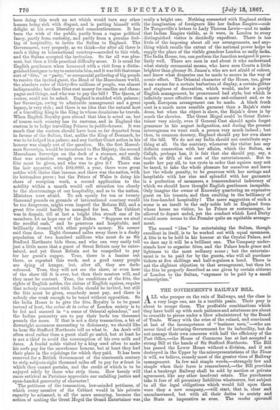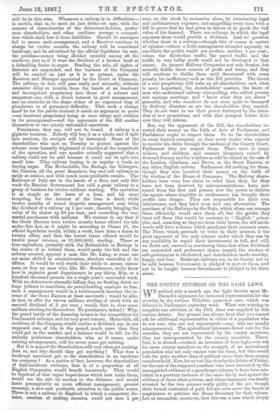THE GOVERNMENT'S RAILWAY BILL. A LL who prosper on the ruin
of Railways, and the class is- a very large one, are in a terrible panic. Their prey is about to escape them. The profitable combinations which they have built up with such patience and astuteness are about to crumble to pieces under a blow administered by the Board of Trade. Weary with the cries of the ruined, and convinced at last of the incompetence of " business men,"—who are never tired of lecturing Government for its imbecility, but do. not manage their own concerns with half the efficiency of the Post Office,—the House of Commons has at last accepted a• strong Bill at the hands of Sir Stafford Northcote. The Bill has passed the Lower House without a division, and if not destroyed in the Upper by the misrepresentations of the Times it will, we believe, remedy most of the greater vices of Railway management. In few and simple words,—strangely few and simple when their force is remembered,—the Bill provides that a bankrupt Railway shall be sold by auction or private agreement, like any other insolvent estate. The purchasers take it free of all pecuniary liabilities whatsoever, but subject to all the legal obligations which would fall upon them were they a new company,—will start, that is, clear and unembarrassed, but with all their duties to society and the State as imperative as ever. The modus operandi will be in this wise. Whenever a railway is in difficulties— is unable, that is, to meet its just debts—it may, with the consent of three-fourths of the debenture-holders, prefer- ence shareholders, and other creditors arrange a composi- tion which shall free it from liabilities. Should its managers fail to secure such arrangement, and a Receiver continue in charge for twelve months, the railway will be considered bankrupt, and be advertised by the official liquidator for sale, the purchase-money being divided rateably among all the creditors, just as if it were the dividend of a broken bank or a defaulting dealer in sugar. Pending the sale, all rights of distraint are suspended, and the business of the Company will be carried on just as it is at present, under the Receiver and Manager appointed by the Court of Chancery. The railway, in fact, will pass easily and naturally, without excessive delay or trouble, from the hands of an insolvent and incompetent proprietary into those of a solvent and competent one, with a direct interest in good management, and no obstacles in the shape either of an organized ring of plunderers or of pecuniary difficulty. That such a change must be for the public interest it needs no argument to prove insolvent proprietary being at once stingy and reckless in its management—and the opponents of the Bill confine themselves to two utterly unfounded assertions.
Purchasers, they say, will not be found. A railway is a gigrintic business. Nobody will buy it as a whole, and if split into sections, its receipts will be destroyed. Some of the shareholders who met on Tuesday to protest against the scheme seem honestly frightened at the idea of the magnitude of the operation, and one speaker actually suggested that a railway could not be sold because it could not be split into small lots. Why, railway buying is as regular a trade as buying sugar. The Rothschilds, the Barings, the Erlangers, the Pereires, all the great financiers, buy and sell railways as easily as estates, and with much more profitable results. The Railways of Italy are in the hands of a firm, and only this week the Russian Government has sold a great railway to a group of bankers for twelve millions sterling. The operation is as simple as the issue of a loan, and far more tempting, for the interest of the loan is fixed, while twelve months of sound despotic management may bring the dividend of a railway up 1 per cent., thereby bringing the value of its shares up 20 per cent., and rewarding the suc- cessful purchasers with millions. We venture to say that if the Great Eastern were twelve months hence offered for sale under this Act, as it might be according to Clause 21, the official liquidator would, within a week, have from a dozen to twenty offers, and that the lowest terms offered would be twelve years' revenue, or 11,000,0001. sterling. Three or four capitalists, probably with the Rothschilds or Barings in the centre of or behind them, would make the bid, and the railway secured, appoint a man like Mr. Laing, or some one yet more skilled in administration, absolute controller of its. affairs. It would be well worth their while to secure states- men, or buy up men who, like Mr. Scadamore, really know how to organize great departments, to pay thirty, fifty, or a hundred thousand pounds for a single year's successful work. With no debentures eternally falling due, no floating debts, no huge jobbers to -conciliate, no proxy-holding employe's to fear, such a management would in a twelvemonth increase the in- come of the Great Eastern at least one-tenth ; would be able, in fact, to offer the eleven millions sterling of stock with an assured dividend of 9 per cent. ; would, that is, clear some millions sterling for themselves. No purchasers, indeed ? Why, the grand battle of the financing houses is the competition for Continental railways, and for very good reasons. Meanwhile, all creditors of the Company would receive a dividend, say, in our supposed case, of 15s. in the pound, much more than they could get in the market, and a balance would be left for the unlucky preference shareholders, who, as it seems, under existing arrangements, will for seven years get nothing. But it is argued the Shareholders will very often get nothing. Just so, and why should they get anything What does a bankrupt merchant get, or the shareholders in an insolvent tea company ? As a matter of fact, however, the shareholders of half-insolvent railways, that is of a proportion of all English Companies, would benefit immensely. They would be deprived of that vague hopefulness which now ruins them, would see the sale by auction in the distance, and would insist peremptorily on more efficient management, greater economy, a new and profitable attention to the public wants. There is not a railway in England in which a competent dic- tator, careless of making enemies, could not save 1 per cent. on the stock by economies alone, by terminating legal and parliamentary expenses, and compelling every man with a bill to prove that he had given in labour or in goods the full value of his demand. There are railways in which the legal expenses alone would provide a dividend. And we question whether there is a railway—though this of course is matter of opinion—where a little management intended expressly to conciliate the public would not produce another 1 per cent., where the third-class traffic, the parcel traffic, and the traffic in very bulky goods could not be developed to that extent. At present Railway Companies not only despise, but actually dislike those sources of profit and worry, and they will continue to dislike them until threatened with some penalty for inefficiency such as this Bill provides. The threat of a new proprietary will wake up all shareholders, and, what is more important, the shareholders' masters, the knots of men who understand railway wire-pulling, who collect proxies and manage meetings, and " know what they are about" generally, and who somehow do not seem quite so dismayed by Railway disasters as are the shareholders they control. They do not want to see their power destroyed by the intru- sion of new proprietors, and with that prospect before their eyes they will reform.
But, say the opponents of the Bill, the shareholders in- vested their money on the faith of Acts of Parliament, and Parliainent ought to respect them. So do the shareholders in every limited company, so does every trader who expects to recover his debts through the medium of the County Court. Parliament does not respect them. There were as many widows, and children, and country clergymen ruined by Overend Gurney and Co.'s failure as will be ruined by the sale of the London, Chatham, and Dover, or the Great Eastern, or any other English railway. Parliament did nothing for them, though they also invested their money on the faith of the wisdom of the House of Commons. The Railway share- holders have even less claim to relief than they, for they have not been deceived by misrepresentations, have pos- sessed from the first and possess now the power to dismiss the agents whose stupidity or recklessness has brought their profits into danger. They are responsible for their own misfortunes, and they have even now one alternative. The purchase of the Railways by the State, which alone can manage them efficiently, would save them all, but the guides they trust tell them this would be contrary to " English " princi- ples, and, smarting as they are from their losses, the old catch- words still have a charm which paralyzes their common sense. The Times, which pretends to .write in their interest, is the great opponent of the only scheme under which they can by any possibility be repaid their investments in full, and will, we doubt not, succeed in convincing them that when dividends are suspended and preference shares unpaid, the wisdom of self-government is vindicated, and shareholders made wealthy, happy, and free. Bankrupt railways are, in its theory, not to be sold because Government is pledged to protect them, and not to be bought because Government is pledged to let them alone.































 Previous page
Previous page